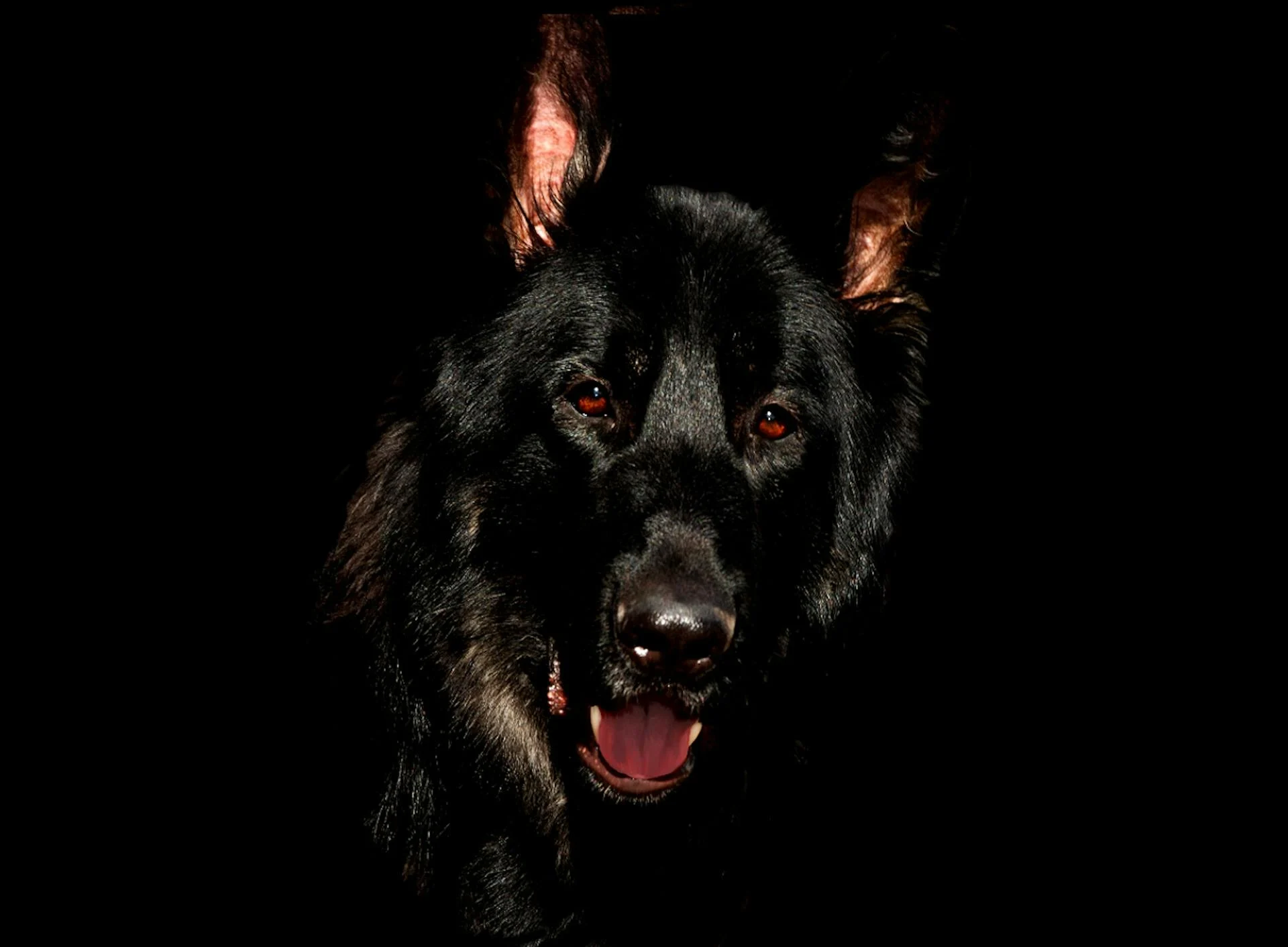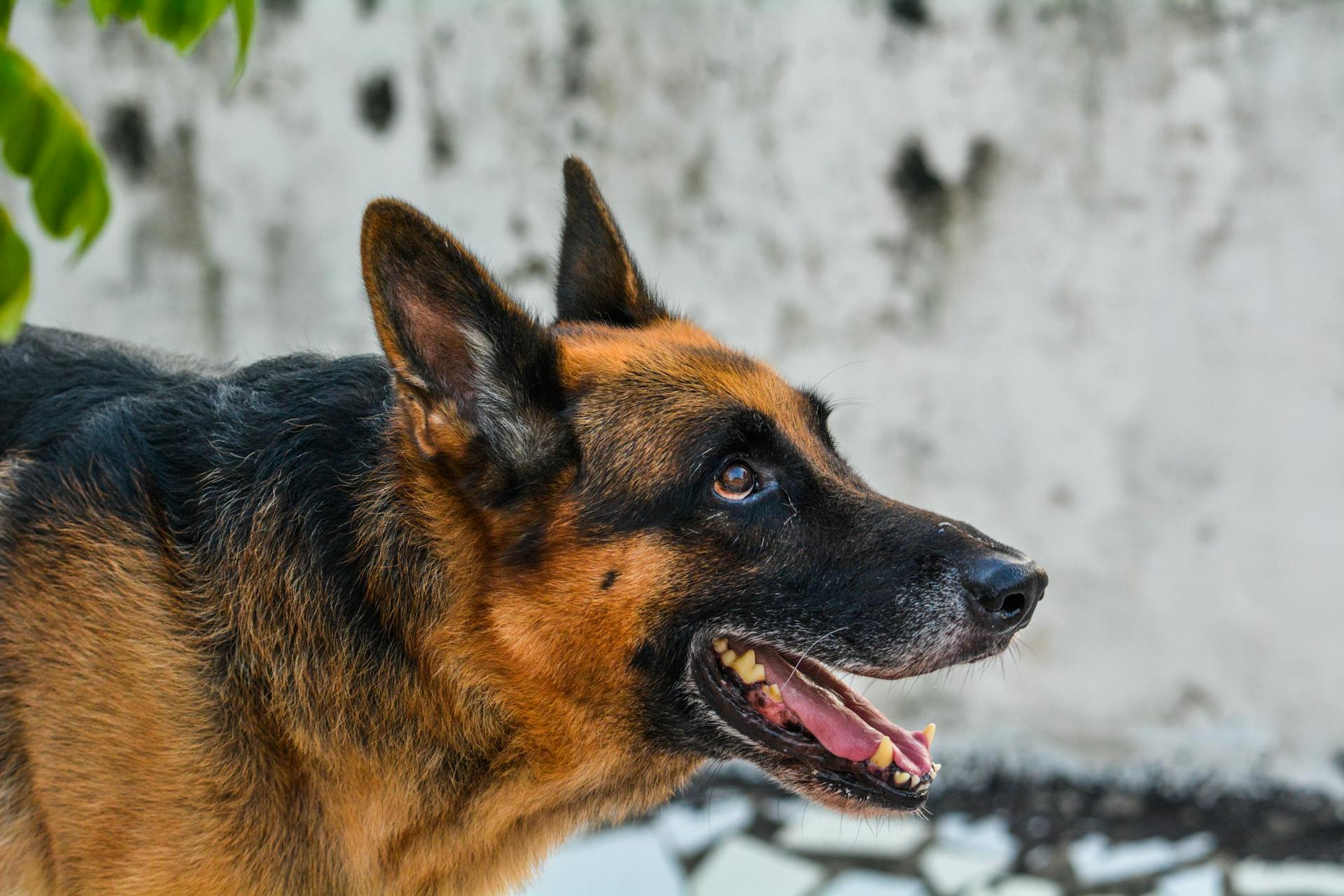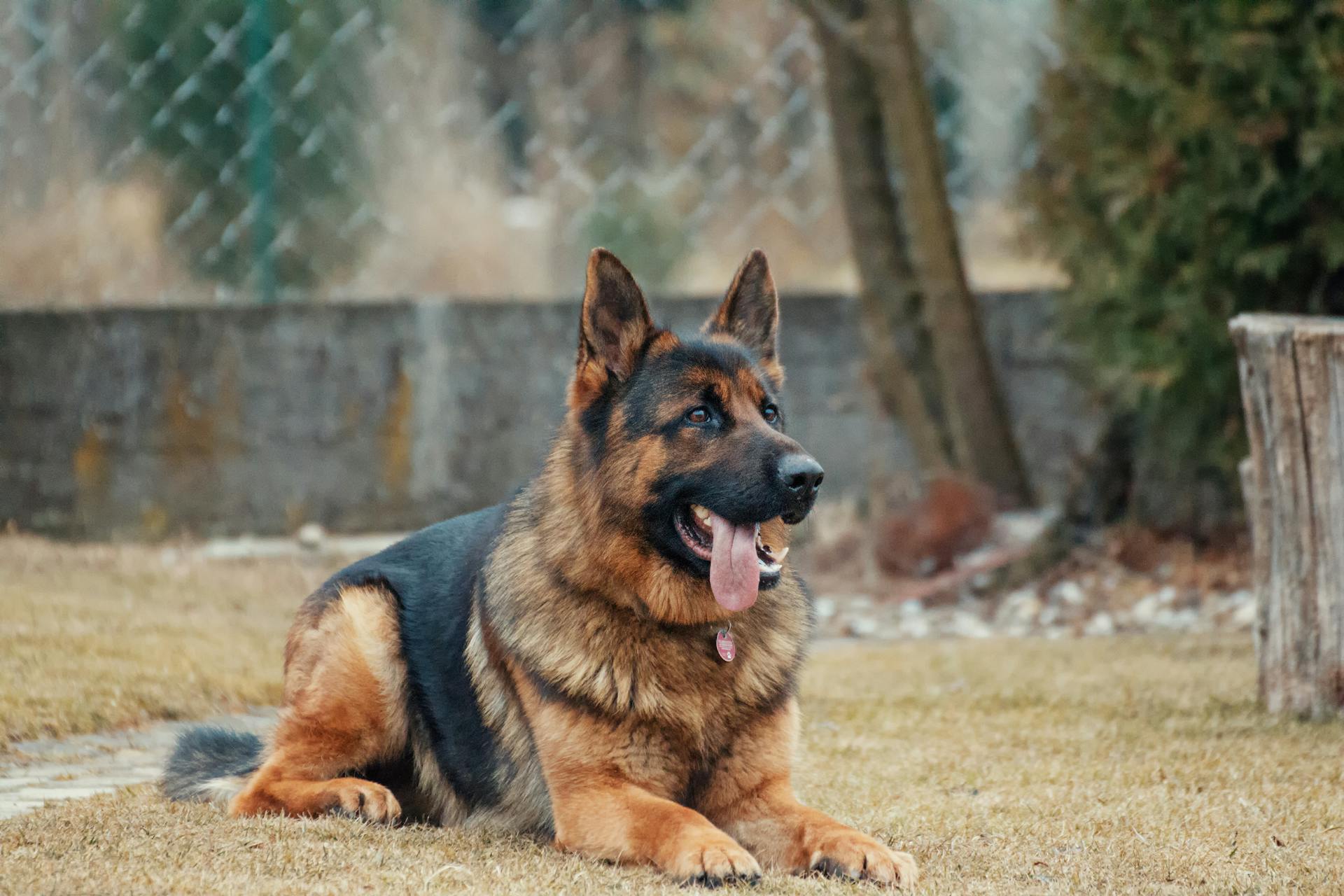
German Shepherd Golden Retriever dogs are a unique and exciting breed combination. They are often referred to as Shep Retrievers or Gold Shepherds.
These dogs generally weigh between 75-110 pounds and stand between 22-26 inches tall. They are a medium to large-sized breed.
Their lifespan is typically between 10-13 years, but with proper care and attention, some have been known to live up to 15 years or more. Regular exercise and a balanced diet are essential for maintaining their overall health.
Breed Characteristics
The German Shepherd Golden Retriever mix is a unique breed with a wide range of possible characteristics. They can inherit the athletic build of the German Shepherd or the lanky build of the Golden Retriever.
Their legs can be muscular like the German Shepherd or long like the Golden Retriever. Their face can be long and square like the German Shepherd or have a straight muzzle like the Golden Retriever.
Readers also liked: White Long Haired German Shepherd Dogs
Their ears can be large and stand straight like the German Shepherd or flop over like the Golden Retriever. Their eyes can be medium size and intelligent like the German Shepherd or deep brown and expressive like the Golden Retriever.
Here's a summary of their possible physical characteristics:
Physical Characteristics
The Golden Shepherd Mix is a unique breed, and its physical characteristics can vary depending on its parents. They can grow to be quite large, with a height range of 21-26 inches and a weight range of 50-85 pounds.
Their build can be athletic or lanky, depending on the German Shepherd or Golden Retriever traits they inherit. They may have a muscular or long-legged build, with a sturdy frame and a deep chest.
Their face and muzzle can be long and square, or straight and broad, with a long and smooth or bushy tail. Their ears can be large and stand straight, or floppy and folded over.
Their eyes are usually medium-sized and intelligent, or deep brown and expressive. Their coat can be short, long, or medium in length, and can range in color from black to white, with common colors including cream, tan, yellow, and golden.
Here's a breakdown of the possible coat colors and patterns:
Their double coat is medium to long in length and very thick and dense, making them a moderate shedder. They may inherit the facial markings from their German Shepherd parent, and their ears can be either erect or floppy.
Temperament
The Golden Shepherd is a friendly and sociable pup who loves to be in the very heart of the family fun. He gets along with all family members and is not focused on just his master.
This mix combines the German Shepherd's protectiveness with the Golden Retriever's easy-going temperament, making them the perfect match for those looking for a loving pooch who'd also make a good watchdog. They are loyal, playful, and intelligent, inheriting the best traits from both parents.
Here's an interesting read: Are German Shepherds Good Pets
As a social butterfly, the Golden Shepherd is addicted to human company and intensely attached to his family. He will suffer from extreme separation anxiety if left alone for too long.
This mix will be warm and affectionate towards most people they come across if trained and socialised, unless provoked. They can be a little on the needy side and thrive on being around their family, needing a lot of interaction.
The Golden Shepherd is energetic and boisterous, and can lead to destructive tendencies if left alone for too long or feels bored and restless. He needs regular exercise to keep him happy and healthy.
They will often let their master know that there is someone at the gate with a bark or two, but this is more a welcome bark than a warning. However, if your family is in immediate danger, he would not hesitate to protect his family.
With proper training and socialisation, the Golden Shepherd will be friendly with strangers and outsiders, and rarely aloof. He's a great companion for families who want a loving and loyal pup.
If this caught your attention, see: Golden Retriever Family Dog
Care and Maintenance
Brush your German Shepherd Golden Retriever's coat at least once a week to keep shedding in check, and consider investing in a good vacuum cleaner.
Regular nail trimming is essential, as German Shepherd Golden Retrievers tend to get long nails quickly. You may need to use clippers or a grinder periodically, or book an appointment with a trusted groomer.
To keep your German Shepherd Golden Retriever's teeth healthy, brush them nightly and talk to your vet about professional teeth cleanings as they age.
Exercise Needs by Breed
The German Shepherd x Golden Retriever mix needs at least 60-90 minutes of exercise per day, with a mix of physical and mental stimulation.
They adore playing fetch, frisbee, walking, jogging, running, hiking, and swimming, so having an outside play area is a must.
This breed is not suited for apartment living without an exercise outlet, as they will easily become bored and frustrated without their daily jaunt.
They are also highly intelligent and need a variety of brain games to keep them mentally stimulated throughout the day.
Training sessions, ball throwing machines, and treat-filled puzzle toys are great ways to keep their minds busy and learn new tricks.
A large yard is recommended for this breed, as they enjoy spending time in the fresh air and will not do well in small homes or apartment living.
With proper socialization as a young pup, they should do well in a multi-pet household and are great with children, especially older children who they can't knock over.
Grooming
Grooming is a crucial part of caring for your Golden Shepherd, and it's relatively low-maintenance compared to other breeds.
You'll need to brush your Golden Shepherd's coat at least once a week to keep it looking its best and reduce shedding. Regular brushing can also help keep shedding in check, but be prepared for some hair to still fall out.
Golden Shepherds are moderate shedders, especially during spring and fall, so you may want to invest in a good vacuum cleaner to keep your home hair-free.
To keep your Golden Shepherd's nails trimmed, you can either use clippers or a grinder, or book an appointment with a trusted groomer. You may also want to consider brushing his teeth nightly to prevent tartar buildup and promote good oral health.
Regular ear cleaning is also essential to prevent wax buildup, which can be a problem for both Golden Retrievers and German Shepherds. Set a reminder to clean your Golden Shepherd's ears regularly.
Positive reinforcement training is key when it comes to socializing your Golden Shepherd puppy. Enroll him in puppy kindergarten classes or work with a trainer who uses reward-based methods to help him become confident and calm in new situations.
Intriguing read: Golden Retrievers Good Hiking Dogs
Feeding Your Mix:
Feeding Your Mix is a crucial aspect of caring for your German Shepherd Golden Retriever Mix. This large breed requires a high protein diet to thrive.
German Shepherd Golden Retriever Mixes typically reach full maturity between 18 to 24 months old, at which point you can reduce their number of meals to two per day instead of four. This is a good time to start feeding them 1.5 cups of high-quality, protein-rich kibble at each meal.
A high-quality food formulated for large breeds is best, and should contain at least 22% protein to meet their nutritional needs. This will help promote easy digestion and prevent bloat, a common issue in this breed.
As your dog grows, their calorie needs will change, so be sure to consult with your vet to determine the best feeding schedule for your pet. For example, a quickly growing puppy requires more calories than an adult dog, and should eat food specifically formulated for puppies.
Splitting meals over at least two feeding times per day can also help prevent bloat and promote easy digestion. Remember to account for special treats in daily caloric needs to ensure your dog is getting the nutrients they need.
You might enjoy: Why German Shepherds Are the Best
Maintaining Your

A Golden Shepherd's grooming needs are relatively low-maintenance, but they do shed heavily, especially in the spring and fall.
To keep your Golden Shepherd looking his best, brush his coat at least once a week and bathe him as needed with a shampoo formulated for dogs.
Regular brushing can help keep shedding in check, but you may also need to invest in a good vacuum cleaner.
You'll also need to trim your Golden Shepherd's nails periodically, either with clippers or a grinder, or by booking an appointment with a trusted groomer.
Brushing your Golden Shepherd's teeth nightly is essential, and you should also consider professional teeth cleanings as they age.
Cleaning your Golden Shepherd's ears regularly is also crucial to prevent wax buildup.
As a high-energy dog, your Golden Shepherd needs at least 60 minutes of exercise a day, which should be intense and varied to keep them physically stimulated.

They'll enjoy activities like playing fetch, joining you for a jog, and even a dip in the local lake.
To keep your Golden Shepherd's mind busy, provide them with brain games like training sessions, ball-throwing machines, or treat-filled puzzle toys.
A large yard is essential for a Golden Shepherd, as they love spending time in fresh air, but small homes or apartments may not be suitable unless there's an exercise outlet.
As a social dog, your Golden Shepherd will thrive in a multi-pet household, but be sure to give them plenty of attention.
Feeding your Golden Shepherd a large-breed puppy kibble is best, and you should feed them four small meals a day until they're fully grown.
As they mature, you can reduce their meals to two per day, but always consult with your vet to ensure their nutrition needs are met.
With regular veterinary visits, you can help prevent joint diseases like Hip and Elbow Dysplasia and Bloat, a common condition in both parent breeds.
By following these tips, you can help your Golden Shepherd live a long, happy life with you.
Risks
German Shepherd Golden Retriever dogs are generally a healthy breed, but like any dog, they can be prone to certain health issues. They have an average lifespan of 10 to 13 years.
One of the most common health problems in this breed is hip and elbow dysplasia, which affects the joints and can cause lameness. In fact, 1 out of 5 German Shepherds are expected to have this condition.
Regular veterinary check-ups are crucial to detect any potential health issues early on. It's also essential to keep an eye out for signs of bloat, a life-threatening condition that can be fatal if not treated promptly.
Here are some potential health risks to be aware of in German Shepherd Golden Retriever dogs:
- Allergies
- Ear Mites
- Joint dysplasia
- Bloating
- Epilepsy
- Eye problems
- Cancer
- Von Willebrand’s disease
- Degenerative Myelopathy
It's also worth noting that German Shepherd Golden Retriever dogs may be prone to certain eye conditions, such as Progressive Retinal Atrophy or Pigmentary Uveitis, which can lead to total blindness.
Socialization and Training
Socialization is key to developing a confident and happy German Shepherd Golden Retriever dog. Early socialization with all family members, other pets, and even strangers is essential.
These dogs are very eager to please and easily trainable, making them a joy to work with. Positive-reinforcement, rewards-based training is the best approach, as it fosters a strong bond between you and your dog.
High-pitched verbal praise and lots of petting can be enough reward for your German Shepherd Golden Retriever, but if you do use treats, be sure to account for the extra calories in your dog's daily energy needs.
Socializing your puppy with adults, children, and other animals from a young age is crucial to combat any guarding issues that may arise. Meeting the German Shepherd's parents and seeing how they interact with strangers can also give you an idea of what to expect.
Reward-based training is the most efficient way to train a German Shepherd Golden Retriever, especially since they're highly motivated and eager to please. They tend to understand right and wrong quickly if you're proactive in rewarding good behavior.
Stock up on tennis balls to reward your German Shepherd Golden Retriever, as they're more likely to enjoy praise from their master or winning a toy than edible treats. Consistency is key when training this mix, as they can be headstrong and require a firm and consistent master.
Cost and Considerations
The cost of a German Shepherd Golden Retriever mix puppy can vary depending on where you buy from and the pedigree. Typically, the price ranges from $500 to $1500.
To give you a better idea, here's a breakdown of the costs associated with owning a Golden Shepherd:
You'll also want to consider the potential health issues that can affect Golden Shepherds, such as elbow/hip dysplasia and bloat. Regular exercise and veterinary care can help mitigate these risks, but it's essential to be prepared for the costs associated with maintaining your dog's health.
See what others are reading: Common Diseases in German Shepherds
Cost of a Mixed Breed Puppy
The cost of a mixed breed puppy, such as a Golden Shepherd, can vary depending on several factors, including where you buy from and the pedigree of the puppy. Typically, the price ranges from $500 to $1500.
If you're considering buying a Golden Shepherd, it's essential to factor in the cost of spaying or neutering, vaccinations, and microchipping, which can add up to $100-$300. This cost may be included in the initial price, or you may need to pay it separately.
For more insights, see: Golden Retriever Dog Price India

The initial cost of a Golden Shepherd puppy is a significant investment, but it's essential to remember that this is a long-term commitment. With proper care and attention, a Golden Shepherd can live for 10-14 years, providing you with a loyal companion for many years to come.
Here's a breakdown of the estimated costs associated with owning a Golden Shepherd:
Keep in mind that these estimates may vary depending on your location, the puppy's size and health, and other factors.
Rescue & Shelters
If there isn't a Golden Shepherd available at a rescue center, some have a waitlist, which means they'll notify you when they take one in.
Your local dedicated rescue center is the most likely place to find a Golden Shepherd, so it's worth checking them out.
Some rescue centers will give you the opportunity to adopt your perfect pup by notifying you when they take one in.
You can find a dedicated rescue center for German Shepherds or Golden Retrievers in your area to increase your chances of finding a Golden Shepherd.
Discover more: What Age Do German Shepherds Calm down
Frequently Asked Questions
What is a Golden Retriever and German shepherd mix called?
A Golden Retriever and German Shepherd mix is commonly referred to as a Golden Shepherd or Golden German Shepherd. This unique hybrid breed combines the best traits of both beloved breeds.
Which dog is more friendly German shepherd or Golden Retriever?
A Golden Retriever is generally more friendly and eager to play, while a German Shepherd is more focused on being a loyal companion and working with their owner. However, both breeds can make great companions in their own unique ways.
Sources
- https://animalso.com/breeds/golden-retriever-german-shepherd-mix/
- https://www.dailypaws.com/dogs-puppies/dog-breeds/golden-shepherd
- https://petventuresbook.com/blogs/blog/the-ultimate-guide-to-german-shepherd-golden-retriever-mixes
- https://wamiz.co.uk/dog/advice/961/golden-retriever-x-german-shepherd-everything-you-need-to-know
- https://www.caninejournal.com/german-shepherd-golden-retriever-mix/
Featured Images: pexels.com


